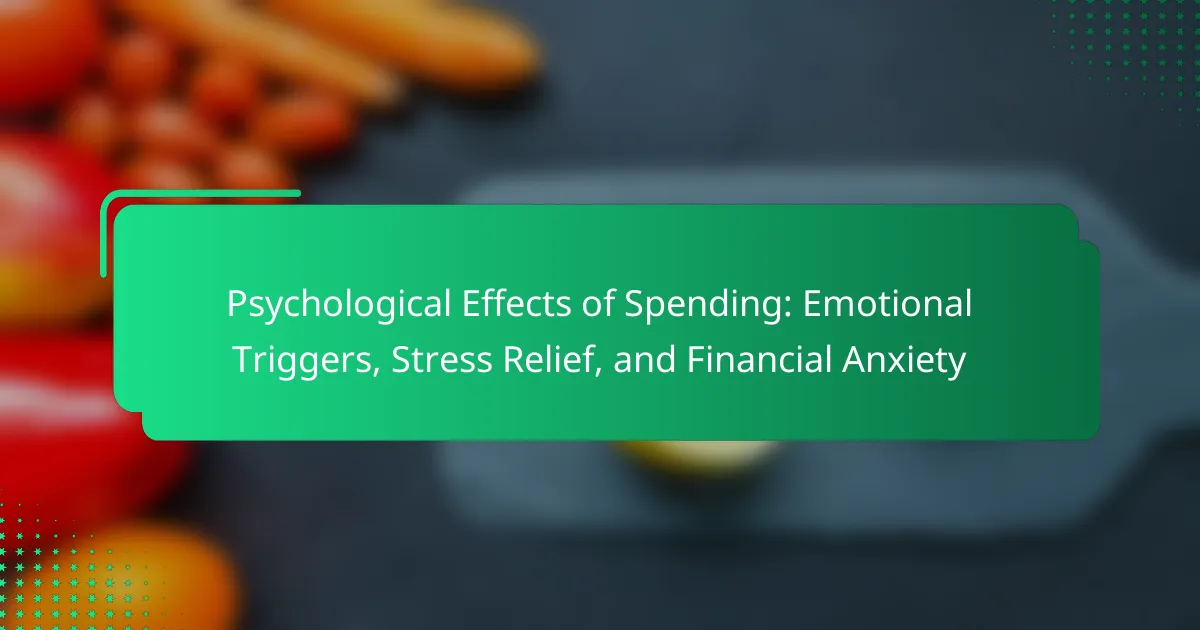Understanding the psychological effects of spending is crucial for maintaining emotional well-being. Emotional triggers often lead to impulse purchases, while stress relief can create cycles of financial anxiety. Recognizing these patterns helps individuals manage their spending behaviors effectively. Strategies for awareness and control can alleviate guilt and promote healthier financial habits.
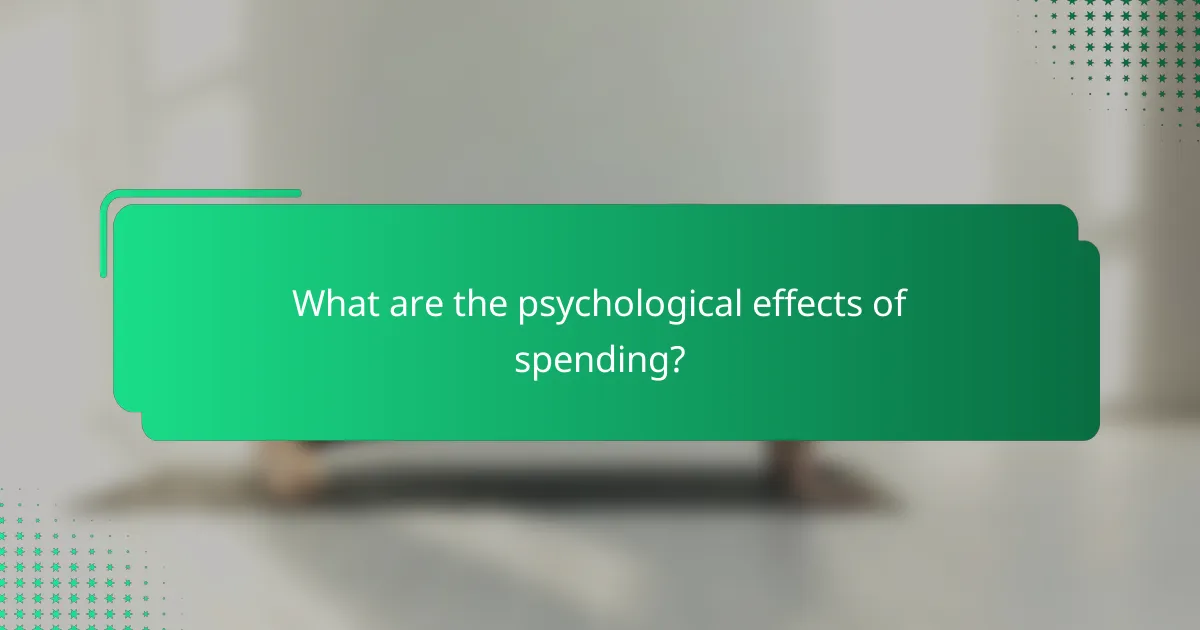
What are the psychological effects of spending?
Spending can trigger various psychological effects, including emotional fulfillment, stress relief, and financial anxiety. Emotional triggers often lead to impulse purchases, providing temporary happiness. However, excessive spending can result in financial anxiety, causing stress and regret. Research indicates that 60% of individuals experience guilt after unplanned purchases, highlighting the complex relationship between spending and mental health. Balancing spending habits is crucial for maintaining emotional well-being while avoiding financial distress.
How do emotional triggers influence spending decisions?
Emotional triggers significantly influence spending decisions by driving impulsive purchases and emotional spending. Consumers often buy products to alleviate stress or enhance mood, leading to financial anxiety. Research shows that emotions such as happiness, sadness, or stress can lead to increased spending, often resulting in buyer’s remorse. Understanding these psychological effects can aid in developing healthier financial habits and managing emotional triggers effectively.
What are common emotional triggers for consumers?
Consumers often experience emotional triggers such as joy, nostalgia, and fear of missing out. These feelings drive impulsive buying behaviors and influence spending patterns. Joy can stem from positive experiences associated with purchases, while nostalgia can evoke memories linked to products. Fear of missing out creates urgency, prompting consumers to act quickly. Understanding these triggers helps brands tailor marketing strategies effectively.
How do marketing strategies exploit emotional triggers?
Marketing strategies effectively exploit emotional triggers to drive consumer behavior. By tapping into feelings such as happiness, nostalgia, or fear, brands create compelling narratives that resonate with their audience. For example, advertisements that evoke joy or relief can lead to increased spending as consumers seek to replicate those emotions.
Unique attributes like urgency and exclusivity further enhance emotional responses, prompting immediate purchases. Research indicates that consumers often make decisions based on feelings rather than logic, highlighting the power of emotional marketing. By understanding these psychological effects, businesses can tailor their strategies to alleviate financial anxiety and promote stress relief through targeted messaging.
In what ways can spending provide stress relief?
Spending can provide stress relief by triggering positive emotions and enhancing mood. Engaging in retail therapy leads to the release of dopamine, which fosters feelings of happiness. Additionally, purchasing items can create a sense of control and accomplishment, reducing feelings of anxiety. Research indicates that mindful spending, particularly on experiences rather than material goods, can yield longer-lasting emotional benefits.
What types of purchases are most associated with stress relief?
Purchases related to stress relief often include experiences, self-care items, and indulgent treats. Experiences like travel or dining out provide a break from routine. Self-care items such as spa products or fitness memberships promote relaxation. Indulgent treats, including comfort food or luxury goods, offer immediate gratification. These purchases can momentarily alleviate financial anxiety by enhancing emotional well-being.
How does the act of spending affect mood and mental well-being?
Spending can positively and negatively affect mood and mental well-being. Emotional triggers often lead to impulse purchases that provide temporary happiness. Conversely, financial anxiety can arise from overspending, causing stress and negative emotions. Research indicates that spending on experiences rather than material goods tends to enhance long-term satisfaction. Understanding these psychological effects helps individuals make informed financial decisions that support their mental health.
What is financial anxiety and how does it manifest?
Financial anxiety is a psychological condition characterized by excessive worry about financial situations. It manifests through symptoms such as stress, avoidance behaviors, and compulsive spending. Individuals may experience physical symptoms like headaches or stomach issues, as well as emotional triggers tied to spending habits. Understanding these manifestations is crucial for addressing the underlying causes of financial anxiety.
What are the psychological symptoms of financial anxiety?
Financial anxiety can lead to various psychological symptoms, including persistent worry, irritability, and difficulty concentrating. Individuals may experience feelings of helplessness, restlessness, and emotional distress. These symptoms can be exacerbated by financial stressors, leading to a cycle of anxiety and poor financial decision-making. Seeking support and developing coping strategies can help mitigate these effects.
How does financial anxiety impact spending behavior?
Financial anxiety significantly alters spending behavior, often leading to impulsive purchases and increased debt. Individuals experiencing financial stress may engage in retail therapy as a coping mechanism, seeking temporary relief from anxiety. This behavior can result in a cycle of guilt and increased financial strain. Studies indicate that nearly 70% of people report spending more when feeling anxious, highlighting the link between emotional states and financial decisions.
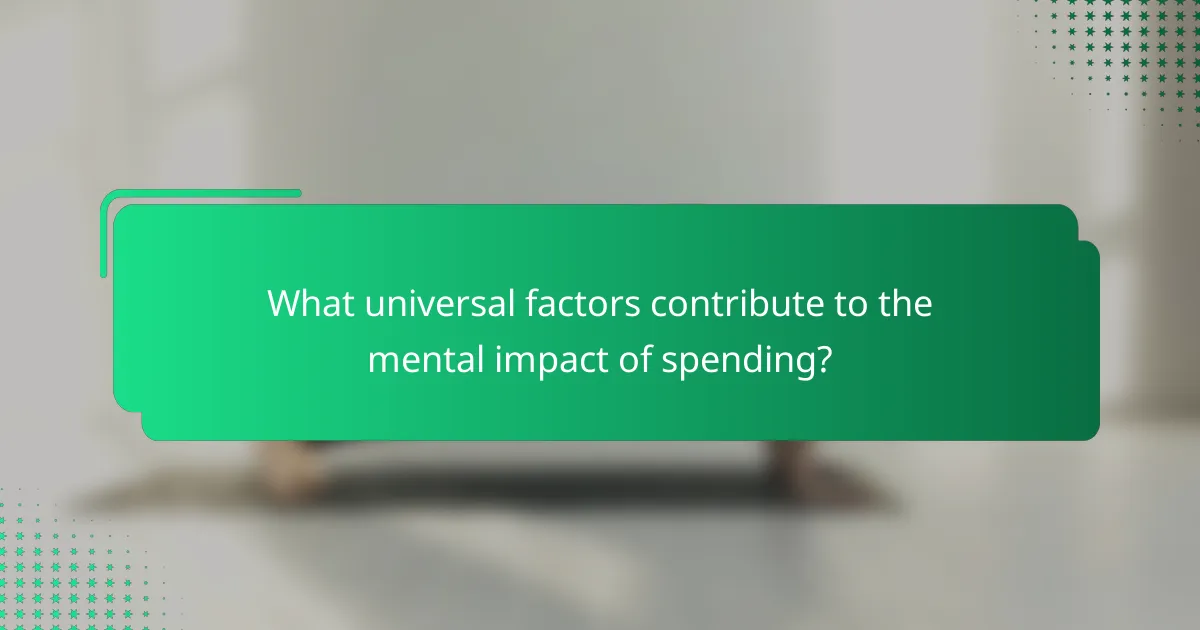
What universal factors contribute to the mental impact of spending?
The mental impact of spending is influenced by emotional triggers, stress relief, and financial anxiety. Emotional spending often arises from feelings of happiness or sadness, leading to impulsive purchases. Stress relief can temporarily alleviate negative emotions, but it may also create a cycle of financial anxiety. This anxiety stems from the fear of overspending and its consequences on financial stability. Understanding these factors helps individuals manage their spending behaviors more effectively.
How does consumer culture shape spending habits?
Consumer culture significantly influences spending habits by triggering emotional responses. Emotional triggers like happiness or stress relief can drive impulsive purchases, while financial anxiety often leads to cautious spending. This dynamic creates a cycle where consumer behavior is shaped by societal norms and personal feelings. For instance, individuals may buy luxury items to elevate mood, reinforcing the link between consumption and emotional well-being. Understanding these psychological effects can help consumers make more informed financial decisions.
What role does social comparison play in spending decisions?
Social comparison significantly influences spending decisions by driving individuals to align their purchases with perceived social norms. People often evaluate their financial choices against those of peers, leading to emotional triggers such as envy or inadequacy. This comparison can result in impulsive buying as individuals seek to maintain social status or approval. Research indicates that social environments can amplify financial anxiety, prompting excessive spending to keep up appearances.

What unique attributes affect the psychological aspects of spending?
Unique attributes affecting the psychological aspects of spending include emotional triggers, stress relief mechanisms, and financial anxiety. Emotional triggers, such as the desire for social acceptance or happiness, often lead to impulsive purchases. Stress relief can manifest in shopping as a coping mechanism, providing temporary comfort. Financial anxiety, characterized by worries about debt or financial stability, can influence spending habits, leading to either excessive spending to alleviate stress or restraint due to fear of financial consequences.
How does individual personality influence spending behavior?
Individual personality significantly shapes spending behavior through emotional triggers and stress responses. For instance, extroverted individuals may spend more on social experiences, while those with high anxiety may engage in compulsive buying as a form of stress relief. Research indicates that personality traits like conscientiousness often correlate with more prudent financial habits, leading to lower spending impulsivity. Understanding these dynamics can help tailor financial advice and interventions to align with individual personality profiles.
What is the relationship between self-esteem and spending?
Self-esteem significantly influences spending behaviors. Higher self-esteem often leads to more thoughtful spending, while lower self-esteem can trigger impulsive purchases as a form of emotional relief. Individuals may use spending to compensate for feelings of inadequacy, resulting in financial anxiety. This relationship highlights the psychological effects of spending, where emotional triggers can drive financial decisions. Understanding these dynamics is crucial for managing both emotional well-being and financial health.
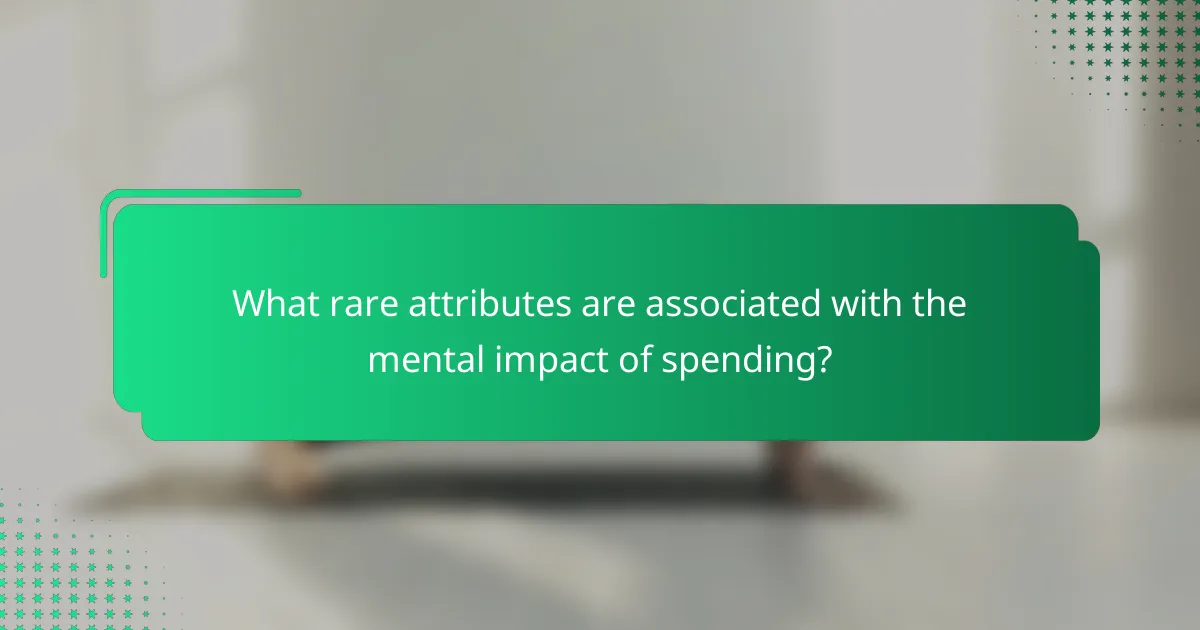
What rare attributes are associated with the mental impact of spending?
The mental impact of spending can include rare attributes such as impulsive joy, guilt-induced spending, and therapeutic retail experiences. These attributes highlight unique emotional triggers that affect mental well-being. Impulsive joy refers to the transient happiness derived from spontaneous purchases, while guilt-induced spending often occurs as a response to negative emotions. Therapeutic retail experiences suggest that shopping can serve as a coping mechanism for stress relief, illustrating the complex relationship between spending and mental health.
How do life events alter spending patterns and psychological effects?
Life events significantly alter spending patterns, influencing emotional triggers, stress relief, and financial anxiety. Major transitions like job loss or marriage can lead to impulsive purchases as a coping mechanism. This behavior often stems from emotional triggers, where spending temporarily alleviates feelings of stress or sadness.
Financial anxiety arises when individuals face uncertainty about their economic stability, prompting changes in spending habits. For instance, during economic downturns, people may prioritize essential expenses over luxury items, reflecting a shift in financial priorities.
Additionally, unique life events, such as having a child or experiencing a bereavement, can create both psychological relief through spending and increased financial pressure. As a result, individuals may oscillate between indulgent purchases for emotional comfort and frugality due to heightened financial concerns.
Understanding these dynamics helps in recognizing how life events shape not only spending patterns but also emotional well-being and financial health.
What is the impact of cultural background on spending psychology?
Cultural background significantly influences spending psychology, shaping emotional triggers and financial behaviors. Different cultures prioritize spending based on values, leading to unique attributes in consumer behavior. For instance, collectivist cultures may emphasize shared experiences, promoting spending on communal activities. In contrast, individualistic cultures might focus on personal gratification, driving purchases that enhance self-image. Financial anxiety also varies; cultures with a strong emphasis on saving may experience heightened stress related to spending. Understanding these dynamics can help marketers tailor strategies to resonate with diverse consumer bases.
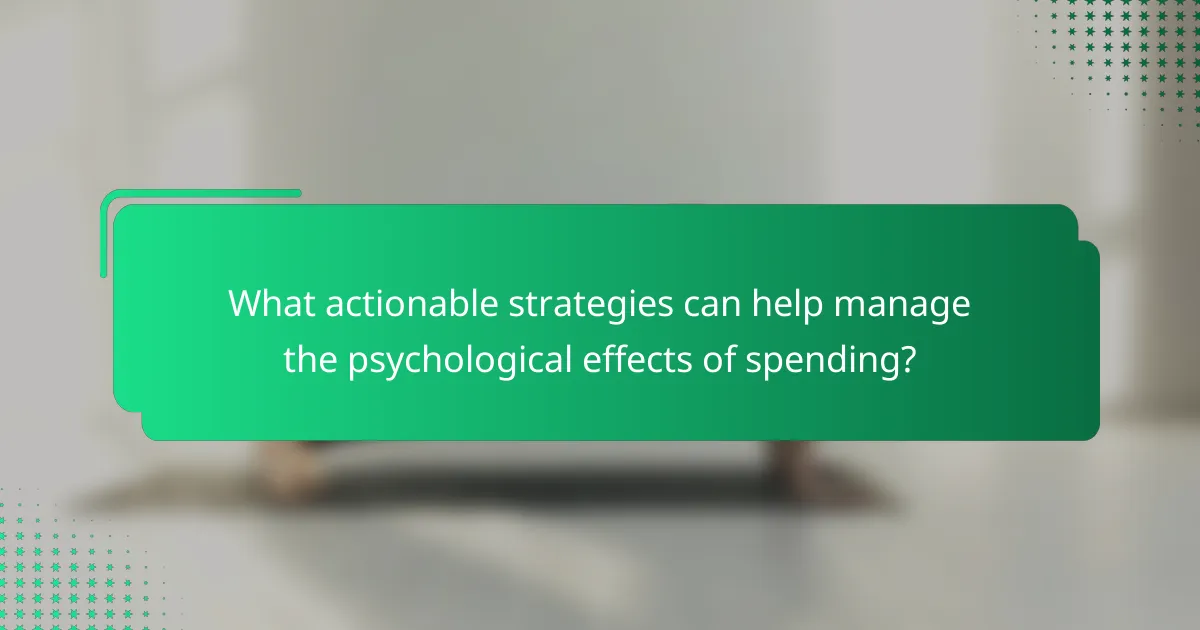
What actionable strategies can help manage the psychological effects of spending?
To manage the psychological effects of spending, adopt strategies that enhance awareness and control. Start by tracking spending patterns to identify emotional triggers. Mindfulness practices can reduce stress and promote healthier financial habits. Set clear budgets to alleviate financial anxiety and prioritize needs over wants. Engage in alternative stress-relief activities, such as exercise or hobbies, to counteract impulsive spending. Lastly, seek support from financial advisors or therapists for personalized strategies.
What are best practices for mindful spending?
Mindful spending involves intentional financial decisions to reduce stress and anxiety. Best practices include setting a budget, tracking expenses, and reflecting on emotional triggers. Recognizing the psychological effects of spending can help manage financial anxiety and promote healthier habits. Engaging in mindful practices, such as pausing before purchases and prioritizing needs over wants, fosters emotional well-being.
How can individuals reduce financial anxiety related to spending?
Individuals can reduce financial anxiety related to spending by adopting mindful spending practices. Creating a budget helps track expenses and prioritize needs over wants. Setting spending limits fosters discipline and reduces impulse purchases. Practicing gratitude shifts focus from material desires to appreciating what one already has, alleviating stress. Engaging in stress-relief activities, such as exercise or meditation, can further mitigate anxiety linked to financial concerns.
What common mistakes should be avoided to enhance mental well-being in spending?
To enhance mental well-being in spending, avoid impulsive purchases, emotional spending, overindulgence, and neglecting financial planning. Impulsive purchases often lead to regret and financial strain. Emotional spending can provide temporary relief but may worsen anxiety. Overindulgence can create a cycle of guilt and stress. Lastly, neglecting financial planning increases long-term financial anxiety.
